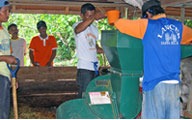
Smallholder Farmers Capitalize on High-value Agricultural Opportunities
Horticulture, coffee and cocoa are smallholder-farmer-based, labor-intensive sectors in Indonesia that generate high incomes. They significantly contribute to over 15 percent of gross domestic product (GDP) for agriculture, and account for the majority of agriculture-sector workforce in relevant production areas. These key agriculture crops catalyze improved nutrition through increased incomes and access to micronutrient-rich foods.
However, high-value agriculture in Indonesia faces several constraints, including low productivity due to poor-quality inputs; low adoption of Good Agricultural Practices (GAP) to meet market requirements; poor grading and sorting; aging estate trees; low mechanization; lack of finance; fragmented production and marketing; high post-harvest losses; and weak links along the value chain.
High-value Agricultural Sector Poses Potential for Farmers
To enable Indonesian high-value agriculture to fully meet its potential in providing improved incomes, employment, and nutrition, ACDI/VOCA began implementing the five-year USAID-funded Agribusiness Marketing and Support Activity (AMARTA) II project.
The USAID Indonesia Office of Economic Growth closed due to a change in USAID priorities. As a result, the AMARTA II project closed ahead of schedule, in August of 2013. Some design elements of the cocoa value chain component were carried over to the Cocoa Innovations Project.





